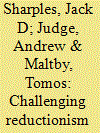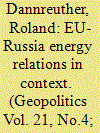| Srl | Item |
| 1 |
ID:
150529


|
|
|
|
|
| Summary/Abstract |
The EU and Russia exist in a complex and, at times, seemingly paradoxical and contradictory relationship. On the one hand, the two sides remain rhetorically committed towards a close and developing strategic partnership. On the other, the EU-Russia political relationship is currently at its lowest ebb since the end of the Cold War due to the crisis in Ukraine. A mixture of politics, economics and geography provide an impetus for the development of mutually beneficial relations and, at the same time, obstacles to the achievement of such a positive partnership.
|
|
|
|
|
|
|
|
|
|
|
|
|
|
|
|
| 2 |
ID:
150538


|
|
|
| 3 |
ID:
150532


|
|
|
|
|
| Summary/Abstract |
This article argues that strategic culture, long consigned to the margins of broader, more substantial IR theories, offers a novel mode by which to explore recent developments in EU-Russia energy relations. Approaching seminal strategic policies from the perspective of institutionalised norms and cultural value-sets, strategic culture explores the power of the past and its ability to produce and influence national attitudes in governments and societies. This enables analyses of strategic energy relations between actors like the EU and Russia to move beyond obvious polarities to nuanced insights about the national value sets by which energy security is itself rendered strategic. Beginning with the individual strategic cultures of both the EU and Russia within the area of contemporary energy security policies, the article then appraises the range of bilateral EU-Russia energy security policies, suggesting that in many ways, these shared policies constitute a sector-specific strategic energy culture that includes both the EU and Russia. Areas of ongoing intransigence and policy convergence in EU-Russia energy security approaches constitute the case studies, illustrating that both sides are essentially motivated toward the same goals of energy security, market prosperity and actor-based prestige, but on the basis of vastly different visions, using widely diverse modes of implementation, and with dissimilar standards of evaluation. The analysis then appraises whether this co-constituted area is progressive or regressive in terms of the cooperation or conflict generated between the two sides, concluding that a basis of acknowleged commonalities – made available through strategic culture perspectives – both sides retain the impetus to cooperate to the point of complete agreement on some areas, whilst simultaneously remaining in conflict to the point of aggression in others.
|
|
|
|
|
|
|
|
|
|
|
|
|
|
|
|